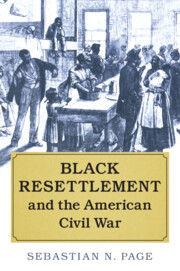Book contents
- Black Resettlement and the American Civil War
- Cambridge Studies on the American South
- Black Resettlement and the American Civil War
- Copyright page
- Dedication
- Contents
- Figures and Maps
- Acknowledgments
- Terminology
- Abbreviations
- Maps
- Introduction
- 1 The Revival of “Colonization,” to 1861
- 2 The Revival of “Emigration,” to 1862
- 3 The Republican Party and Resettlement, to 1863
- 4 Resettlement in Latin America, to 1864
- 5 Resettlement in the European West Indies, to 1865
- 6 Alternatives to Foreign Resettlement, to 1868
- Epilogue
- Index
3 - The Republican Party and Resettlement, to 1863
Published online by Cambridge University Press: 21 January 2021
- Black Resettlement and the American Civil War
- Cambridge Studies on the American South
- Black Resettlement and the American Civil War
- Copyright page
- Dedication
- Contents
- Figures and Maps
- Acknowledgments
- Terminology
- Abbreviations
- Maps
- Introduction
- 1 The Revival of “Colonization,” to 1861
- 2 The Revival of “Emigration,” to 1862
- 3 The Republican Party and Resettlement, to 1863
- 4 Resettlement in Latin America, to 1864
- 5 Resettlement in the European West Indies, to 1865
- 6 Alternatives to Foreign Resettlement, to 1868
- Epilogue
- Index
Summary
From the mid-1850s, a new force emerged in American politics: the Republican Party. Opposed to slavery and determined to prevent it taking hold in the territories of the United States, a cadre of politicians centered on a family of boosters from the Upper South, the Blairs, lobbied their Republican colleagues to adopt colonization as national policy. But the Blairs failed to persuade their new allies that their own scheme had improved on that of the ACS, despite their abandoning West Africa for the closer, geostrategically valuable Central America. Following the election of Abraham Lincoln, the secession of the southern states and the outbreak of war transformed the forecast for the Republican colonizationists, whose vision chimed with Lincoln’s own support for colonization. Prodded by the president, the Republican-dominated Congress added voluntary colonization to its laws freeing the slaves of the District of Columbia and in the rebellious states. But that was not enough for Lincoln, who asked legislators to write colonization into the US Constitution – and ignored those abolitionists who argued that his own Emancipation Proclamation should end his attempts to expatriate potential soldiers.
Keywords
- Type
- Chapter
- Information
- Black Resettlement and the American Civil War , pp. 99 - 142Publisher: Cambridge University PressPrint publication year: 2021

